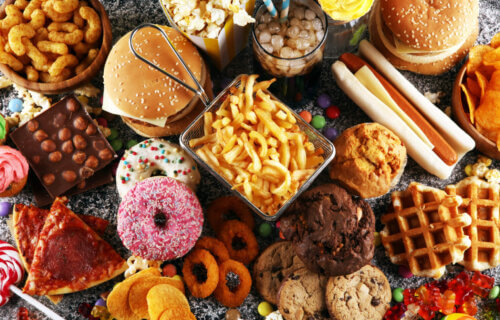MEDFORD, Mass. —Two-thirds of children’s calories are now coming from “ultraprocessed” junk food and sweets, according to a new study.
These types of foods, often high in added sugar, sodium, and carbohydrates, are also low in fiber, protein, vitamins, and minerals. Additionally, researchers from Tufts University say these foods have a link to diabetes, obesity, and other serious medical conditions, including cancer.
Ultraprocessed foods contain ‘substantially higher’ calories, sodium
The number of calories consumed from dishes like frozen pizza and burgers surged five times between 1999 and 2018, going from 2.2 to 11.2 percent. The second biggest spike in calories came from packaged sweet snacks and desserts, which grew from 10.6 to 12.9 percent.
Meanwhile, calories from healthier, unprocessed or minimally processed foods decreased from 28.8 to 23.5 percent. Researchers say the rest of the calories children are consuming are coming from moderately processed foods such as cheese, canned fruits and vegetables, and consumer-added flavor enhancers like sugar, honey, maple syrup, and butter.
“Some whole grain breads and dairy foods are ultraprocessed, and they’re healthier than other ultraprocessed foods,” says corresponding author and nutrition epidemiologist Dr. Fang Fang Zhang in a university release.
“Processing can keep food fresher longer, allows for food fortification and enrichment, and enhances consumer convenience,” Zhang continues. “But many ultraprocessed foods are less healthy, with more sugar and salt, and less fiber, than unprocessed and minimally processed foods, and the increase in their consumption by children and teenagers is concerning.”
“In additional analyses, we compared the composition of ultraprocessed foods to non-ultra processed foods using data from the 2017-2018 period,” adds Dr. Lu Wang, a postdoctoral researcher at the Friedman School of Nutrition Science and Policy at Tufts. “We found that ultraprocessed foods contain a substantially higher percent of calories from carbohydrates and added sugars, and higher levels of sodium, but also had less fiber and a lower percentage of calories from protein.”
Kids are drinking less soda
The study did reveal some good news as calories from sugary drinks dropped from 10.8 to 5.3 percent of overall calorie intake among kids. That’s a drop of 51 percent.
“This finding shows the benefits of the concerted campaign over the past few years to reduce overall consumption of sugary drinks,” Dr. Zhang says. “We need to mobilize the same energy and level of commitment when it comes to other unhealthy ultraprocessed foods such as cakes, cookies, doughnuts and brownies.”
“Food processing is an often-overlooked dimension in nutrition research. We may need to consider that ultraprocessing of some foods may be associated with health risks, independent of the poor nutrient profile of ultraprocessed foods generally,” Zhang adds.
The research also revealed there was a larger increase in the consumption of ultraprocessed foods among non-Hispanic black people (10.3%) and Mexican-Americans (7.6%) than non-Hispanic white people (5.2%). The team behind the study also points out there were no statistically significant differences in the findings after factoring in parental education and family income.
“The lack of disparities based on parental education and family income indicates that ultraprocessed foods are pervasive in children’s diets,” Dr. Zhang concludes. “This finding supports the need for researchers to track trends in food consumption more fully, taking into account consumption of ultraprocessed foods.”
The findings appear in the journal JAMA.
South West News Service writer William Janes contributed to this report.
